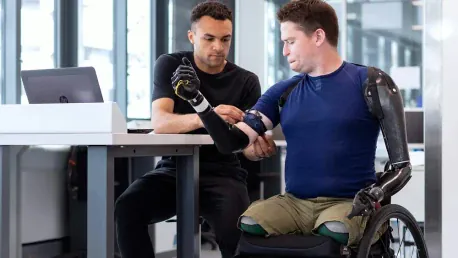Artificial Intelligence (AI) has been heralded as a transformative force across various industries, but a recent report from Randstad has highlighted an unexpected group leading its adoption in the workplace—workers with disabilities. These pioneering individuals are leveraging AI not only to overcome challenges unique to their circumstances but also to enhance overall productivity and contribute to a more inclusive work environment. According to the report, 47% of workers with disabilities are utilizing AI in their daily tasks to improve their work efficiency, as opposed to just 36% of their non-disabled peers. This significant difference underscores the innovative use of AI as a powerful tool for problem-solving among disabled employees.
Randstad’s general manager of equity, diversity, and inclusion, Madeline Hill, emphasizes the crucial role that these workers play in adopting AI. She notes that workers with disabilities are among the most innovative in utilizing this technology to their advantage, and this trend is reflected in their proactive approach to AI education. A remarkable 47% of disabled employees are independently seeking AI training, contrasting with 36% of their non-disabled colleagues who do the same. This trend of proactive engagement with AI further highlights their commitment to maximizing the benefits of technology in the workplace.
Enhancing Workplace Equity Through AI
A notable theme emerging from Randstad’s findings is the belief among workers with disabilities that AI holds significant promise for enhancing workplace equity and inclusivity. More than half of these workers, approximately 51%, are confident that AI can play a pivotal role in improving equity within their organizations. This belief is not just theoretical; it is backed by their actions. They are not waiting for employers to offer AI training opportunities but are actively seeking it themselves. This proactive approach to upskilling demonstrates both a clear understanding of AI’s potential and a commitment to remain competitive in a rapidly evolving job market.
Their dedication to acquiring AI skills also reflects in their professional decisions. The report reveals that 28% of workers with disabilities would consider leaving their current jobs if there are no opportunities for AI upskilling. This figure is significantly higher compared to 16% of non-disabled employees who share the same sentiment. The data sends a strong message to employers: equitably providing AI training and support is not just beneficial but imperative. Failure to do so could result in the loss of talented and motivated workforce members who are integral to driving innovation and inclusivity within the organization.
The Imperative for Equitable AI Training and Support
Employers must acknowledge the critical need for tailored AI training programs to support their disabled workforce, as highlighted by Madeline Hill. Without these initiatives, businesses risk exacerbating existing talent shortages by failing to retain skilled workers who are increasingly reliant on AI for their roles. The Randstad report indicates that nearly three in ten workers with disabilities are likely to leave their jobs if they don’t receive adequate AI training. This stark statistic should prompt employers to reconsider their training and development strategies urgently to retain this vital segment of the workforce.
The need for equitable AI training ties into a broader call for better overall support for employees with disabilities. While AI offers numerous opportunities for improving productivity and inclusivity, it’s evident that many organizations, particularly in Australia, lack awareness about the appropriate support mechanisms. Over half of these workers (52%) request better accessibility support, which indicates that current measures are insufficient. Furthermore, 23% of disabled employees feel their employers haven’t made the necessary adjustments to accommodate their specific needs, further emphasizing the importance of a more informed and responsive approach.
Addressing Ongoing Accessibility and Accommodation Issues
Artificial Intelligence (AI) is often seen as a game-changer across many industries, but a recent Randstad report has shed light on a surprising group at the forefront of its adoption: workers with disabilities. These trailblazers are using AI to tackle challenges specific to their conditions, boost their efficiency, and create a more inclusive work environment. The report reveals that 47% of workers with disabilities employ AI in their daily tasks to enhance productivity, compared to just 36% of their non-disabled counterparts. This considerable gap highlights how disabled employees are innovatively using AI for problem-solving.
Madeline Hill, Randstad’s general manager of equity, diversity, and inclusion, underscores the importance of these workers in AI adoption. She points out that disabled employees are among the most resourceful in harnessing this technology, which is evident in their approach to AI education. An impressive 47% are pursuing AI training on their own initiative, whereas only 36% of non-disabled workers do the same. This proactive stance shows their dedication to leveraging technology to its full potential in their roles.









